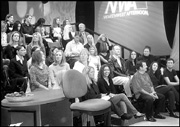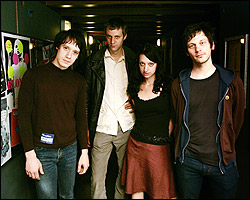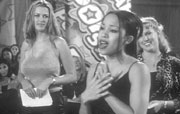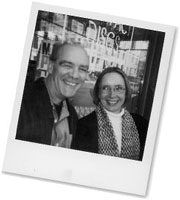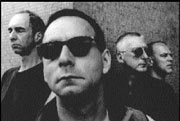SEVERAL YEARS AGO, my father married a Filipino woman whom he met through a matchmaking organization. Their relationship, although unusual, is inspiring, and their love is one of the few things I still have the courage to believe in. It’s based on honesty: an honest need for love and companionship. As I’m riding a huge freightlike elevator up to the KOMO TV studio, I remind myself of this in an effort not to pass judgment on the scene around me.
I’m here to watch the auditions for the next season of ABC’s The Bachelor, the wildly successful reality TV show that ended its second season last week. Combining elements of Survivor, Who Wants to Marry a Millionaire, and— perhaps inadvertently—Jerry Springer, The Bachelor creates an artificial environment in which two people will, if all goes as planned, fall in love and marry by the end of the season. The audition waiting room is a life-sized model of the show being cast; the women far outnumber the men and the icy stares and thin-lipped forced smiles among the dominant subgroup expose their obedience and unchecked hunger.
But not everyone here is a potential Bachelor or Bachelorette. When I hear the girl next to me use the word “extrapolate,” I guess that she and her friends are here, innocently enough, to catch a taping of Northwest Afternoon, KOMO’s long-running daily talk show that will today be playing host to these tryouts. I ask, just to be sure, and find my suspicions are correct. There is a look of confusion in one girl’s eyes as she glances around the room—it’s as if she is visiting a foreign country. Her hair is brown and simple and her dress plain. She seems lost in this sea of frosted, streaked blondes, manicured French tips, and black leather knee-high boots.
One of the five or six men at today’s audition, an older fellow dressed in a blindingly shiny red shirt and equally reflective black shoes, is chatting up a group of tall blondes, reusing a line I heard him try earlier on a different group of tall blondes.
“I have a purse just like that, but I left it at home today—good thing, huh?”
His affable smile and goofy attempts at charm are getting him nowhere, but, nonetheless, I admire his tenacity. During the preshow interviews downstairs, I heard the woman he’s talking to whisper to her friend, “She’s not 29,” as she watched the producer quiz one of the other girls. I feel like telling him not to worry about her because she’s catty and insecure and her winter tan is most likely nuclear, but instead I swallow hard and stare at my unsexy shoes.
ONCE INSIDE THE studio, I am given a seat offstage to facilitate note taking. Elisa Jaffe, the show’s big sister-like hostess, stops by to tell me that originally, this season’s bachelor, Aaron Buerge, was scheduled to be today’s guest. And then they were told he could appear only via satellite, and then only by phone. In the end he was “too busy” for even that. She says they “pulled a Conan O’Brien” and faked an interview with him, which they might run late in the segment. One of The Bachelor‘s casting producers, Hayley Goggin, is here instead.
Before the show starts, the audience must be warmed up. This task falls to the audience coordinator, who proposes a dance contest, calls for four “uninhibited” volunteers, and entices them with an unnamed prize. Someone cues “Ice Ice Baby,” and we vote by applauding for our favorite dancer—a balding fellow in casual Friday attire. The “prize” was dinner for two at EMP’s Turntable restaurant.
Once Cindi Rinehart is finished scooping the soaps, it’s time to get down to business. Three different groups of four candidates were selected based on the answers they gave during preshow screenings; now they’re in back of the set awaiting their turn on air. One by one, these lucky few are given a shot at telling the world why they should be cast for the fall 2003 season.
Each aggressively attractive bachelorette (and the lone bachelor who made the cut) cites reasons like, “It sounds like fun!” and, “I’m always up for something different.” With few exceptions, their on-air testimonials come off as platitudes, and I fight the urge to run screaming from the building. Sure, it’s difficult to pipe up with something unique when you’ve got a camera in your face, but what bothers me is that these women are willing to parrot themselves just for the opportunity to grovel on camera for the affections of someone they don’t even know. And these days, it seems most Americans will grovel on air for anything so long as they’re on air—but for ABC’s idea of an ideal man? I can’t decide if it’s the cavalier treatment of love and marriage or the public display of desperation that bothers me more. Where before I was gently reminding myself not to judge, I now require a Post-it note on my brain to keep me from doing so.
After the show, die-hard auditioners remain in the studio and are given a private audience with Goggin to ask questions, turn in their applications, and perhaps differentiate themselves from the sea of sameness. One bachelorette from the show’s first season—a Seattle native who was spotted in a bar by Goggin and cast on the spot—shares the stage and fields questions as well. At one point, the two women discuss the camaraderie among the bachelorettes that develops on the show, but I’m not buying it. I’ve seen Survivor, and I’ve seen what happens to an alliance once it’s tested by a public battle and fierce competition. And also, I remember high school.
Near the end, Goggin explains the task of finding the perfect Bachelor.
“It’s a tough job,” she states.
To which a chorus of women responds as if on cue, “Oh, we know!”
And herein lies the simple truth of what I observed—what is, in fact, observable at just about any hour on practically every station on the dial—we are a society desperately in search of love. We will purge ourselves for it, primp ourselves for it, compete for it, and falsely commiserate for it; we will publicly display our insecurities about it, and we will drive across floating bridges and audition for it, even when the audition is only a publicity ploy for the show. We are, it would seem, without much shame.
In the end, most of the singles file out of the studio without any real answers; they’ll leave here today much in the same way they came in: with the hunt in their eyes and a thrill of the kill still an idea they have yet to realize.
